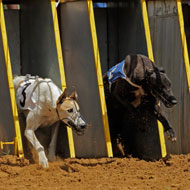
Controversial stadium set to close in July
Animal rights campaigners have launched a petition to save hundreds of greyhounds from the infamous Yat Yuen Canidrome - a controversial racing stadium that is set to close in July.
The petition, which involves animal welfare charity Anima, calls on the government of Macau to save the dogs, which are notoriously kept in cruel and cramped conditions.
Anima president Alban Martins told the South China Morning Post that he fears the dogs may be slaughtered for meat or sent to underground racing tracks.
“Our fear is that if we are not able to rescue them, these animals might be sent to [mainland] China, where there are private races, or Vietnam to run in unregulated race tracks,” he said. “Surely they would be used to feed illegal gambling.”
The Yat Yuen Canidrome is infamous across the world for its brutality and high death rates. Campaigners say that around thirty dogs a month are euthanised for not winning races, and then replaced with greyhounds imported from Australia.
Following public pressure to bring an end to the races and make better use of the land, the Macau government announced that it would not be renewing the stadium’s licence after July 2018.
Anima are now calling on the Macau government to close the Canidrome ‘as quickly as possible’ and has asked it to place the dogs into its care.
‘The Canidrome of Macau is sadly known in the whole world as a place of death, where no greyhound gets out alive. Even now, when the Canidrome is due to close by 2018, the dogs are still continuing to live in shameful conditions and to die without hope,’ the petition reads.
‘For what fate awaits the greyhounds in the Canidrome? How many of them will be alive when it closes? What will happen to the survivors? These are worrying questions, and the answers that are given will undoubtedly have an effect on how Macau is perceived and consequently on its touristic development.’



 The Veterinary Medicines Directorate (VMD) is inviting applications from veterinary students to attend a one-week extramural studies (EMS) placement in July 2026.
The Veterinary Medicines Directorate (VMD) is inviting applications from veterinary students to attend a one-week extramural studies (EMS) placement in July 2026.